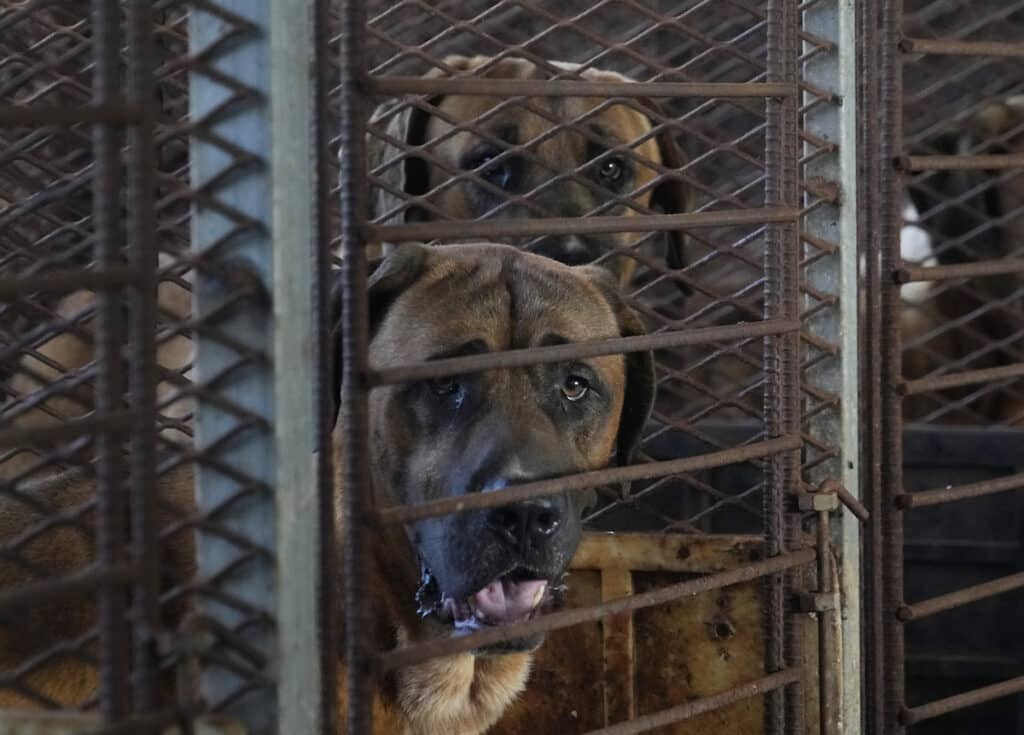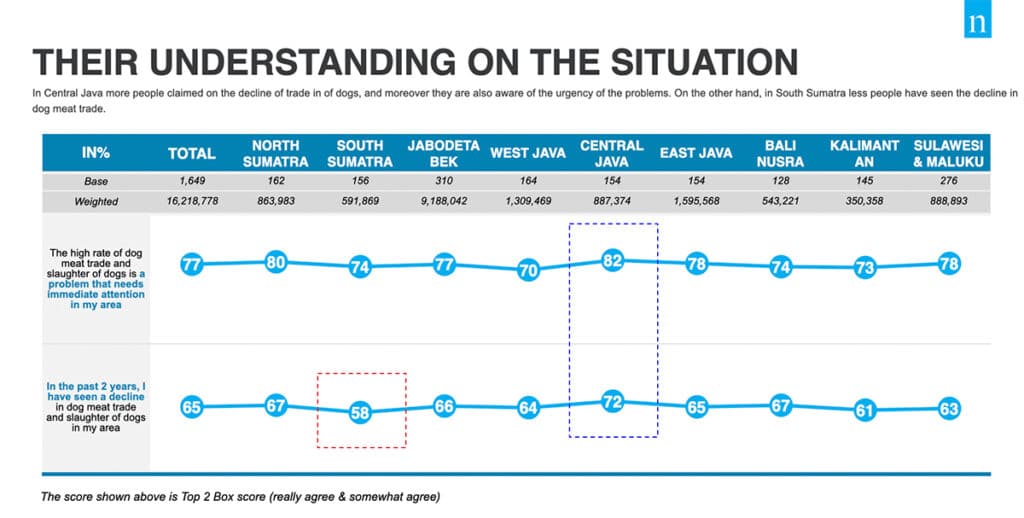Volcanoes are erupting in The Philippines, but on-fire Australia received some welcome rain. The Iran war cries have been called off and The Donald’s military powers are about to be hamstrung by the Senate. Meanwhile, his impeachment trial is starting, and we’re all on Twitter for a front-row seat.
What Could Go Right? Dogs are friends, not food
The dog meat trade is on its way out across Asia.
This is our weekly newsletter, What Could Go Right? Sign up here to receive it in your inbox every Thursday at 5am ET. You can read past issues here.
Dogs are friends, not food
While far less common than it once was, dogs are still eaten in several Asian countries. Humane Society International, an animal rights advocacy group, estimates that 30 million dogs are killed for human consumption every year, most of them in China, Indonesia, and Vietnam.
Until this week, South Korea, too, was one of these countries, although singular in that most dog meat eaten there is produced by farms, much like cows, chickens, or pigs. Elsewhere in Asia, often stray dogs are taken from the streets or pet dogs stolen in order to be killed—gruesomely—and eaten.

Estimates of how many dogs are eaten in South Korea vary. A government-civilian committee created to work on the dog meat legislation pegged the annual average at 388,000.
Change is slow, and then comes all at once. Korean governments have been discussing banning the dog meat trade since the 1980s, but hadn’t gotten legislation over the finish line until Tuesday, after unanimous parliamentary approval.
“This is history in the making I never thought I would see in my lifetime,” Chae Jung-ah, the executive director of Humane Society International Korea, said in a statement.
Despite the legislative stagnation over the years, the dog meat industry has been dwindling on its own. “Compared with the late 1990s,” reports The Wall Street Journal, “the number of dog-meat restaurants has fallen by about 75 percent to roughly 1,700 restaurants nationwide, according to government figures.”
Appetite for it has fallen off, too. More Koreans now own pet dogs, and younger generations in particular aren’t interested in traditional dog meat dishes. A December 2023 survey by Aware found that over 90 percent of respondents have no intention of eating dog meat in the future, a number that has been increasing year by year and is similar across those who own and don’t own pets.
Where else has outlawed dog meat?
South Korea joins a number of other countries that have come down on the dog meat trade. There are two types of dog meat bans. The first bans the slaughter and sale of the animals. The second covers personal consumption.
The Philippines instituted a full ban in 1998. Taiwan banned the slaughter and sale the same year, and consumption in 2017. Thailand passed a full ban in 2014. Dog meat is banned in Singapore as well, although I couldn’t find more details on the legislation. It was outlawed in Hong Kong in 1950, while under the influence of the British. (Personal consumption is still legal in the United Kingdom.)
The lack of industry regulation means that eating dog meat can carry the risk of rabies or trichinosis transmission. In 2020, in reaction to the potential role wet markets played in the Covid-19 pandemic, Nagaland, in India, Siem Reap—Cambodia’s “staging ground for the industry”—and two Chinese cities, together home to 20 million people, outlawed dog meat.
Americans may be surprised to learn that the United States banned the consumption of dogs federally only in 2018. While few eat dogs in the US and while most states had already banned the commercial sale of dog meat, before 2018 it was illegal in only six states to kill your own dog and eat it. The legislation was bipartisan and signed into law by former president Donald Trump.
Indonesia has been considering nationwide legislation since 2018, and while no law has yet been passed, inroads have been made. Thirty-six jurisdictions have outlawed the dog meat trade, 13 of those in 2023 and including the capital city of Jakarta. In July 2023, the issue gained major media attention after dog and cat meat trading was banned in Tomohon Extreme Market, once a popular tourist attraction, after activists filmed sellers maltreating animals, even blowtorching them. (I’m linking the video here since it’s relevant, but I do not advise watching, especially those with weak stomachs or soft hearts.)
Is this just an imposition of Western values?
A common criticism has been that these policies are a kind of cultural imperialism imposed by Western activists. It’s true that Westerners have long been involved in anti-dog meat activism, including prominent celebrities like British comedian Ricky Gervais. The 2018 legislation passed in the States was in part to urge other nations to follow suit.
Scholars have observed, however, as in South Korea, that rising economic fortunes have led naturally to more people becoming pet owners, and an accompanying change in attitude toward dog meat. Pets or no, in countries with an active dog meat industry, a minority of the population consumes it. A Nielsen survey of Indonesians in 2021, for example, found that only 5.4 percent of the population had ever consumed dog meat.

Some do eat dog meat as part of tradition. Many countries, including the US, have exemptions for religious ceremonies, as no one wants to step on cultural toes. But many others eat dog for more pedestrian reasons: 75 percent of dog meat eaters in the Nielsen survey said that their reason for it was because dog meat “has good taste.” That’s versus the 17 percent who said that they ate it because it was served at a traditional ceremony and the 16 percent who said it has health benefits.
What’s next?
South Korea’s new law will end the dog meat industry there by 2027. The three-year gap will allow dog farms, slaughterhouses, and restaurants to phase out their businesses with the help of government subsidies. Violations to the law will bring jail time or fines up to roughly $23,000.
Some city governments in Vietnam have also expressed interest in banning dog meat, although nothing concrete has happened yet. With South Korea’s new law, plus the many other bans that have come into effect recently, the Humane Society sees “a paradigm shift across Asia.” While not everyone is happy with this sea change—the South Korea Dog Meat Association in particular—dog lovers can rejoice.
Quick hits
- Google will eliminate cookies for all Chrome users by the end of this year. Websites will still remember your passwords, but you won’t be followed around everywhere you go on the Internet by those purses you clicked on once.
Below in the links section, safeguarding marine mammals with “bubble curtains,” crushing drug-resistant bacteria with a new antibiotic, opting out of alcohol with Gen Z, and more.
By the Numbers
A pop-up section in which we celebrate numbers that represent substantial improvement in people’s lives
5: The percent of Americans who had passports in 1990
48: The percent who have them now
160M: The number of valid US passports in circulation, nearly double the amount from 2007
Source: The US Department of State
What Could Go Right? S5 E13

The most people in history will vote in 2024, with 78 countries going to the polls. Is democracy really on the ballot, as some say? What new state laws are coming into effect, and is a new space race heating up? Zachary Karabell and Emma Varvaloucas are back to discuss the latest news stories we might have missed. | Listen to the episode
Progress, Please
(Found good news? Tweet at us @progressntwrk or email.)
Other good stuff in the news 🐘
Energy & Environment:
- US firm pilots ‘bubble curtains’ for offshore wind turbine construction | Interesting Engineering
- The year in rainforests: 2023 | Mongabay
- Renewable energy’s share on German power grids reaches 55% in 2023 | Reuters
- African elephant populations stabilize in southern heartlands | The Guardian
- Uruguay’s green power revolution: rapid shift to wind shows the world how it’s done | The Guardian
Public Health:
- Acute sleeping sickness now has a less brutal treatment option | NPR
- An overdose antidote goes viral | Reasons to Be Cheerful
- Gun violence by the numbers in 2023 | The Trace
- Scientists hail new antibiotic that can kill drug-resistant bacteria | The Guardian
Science & Tech:
- Cracking the problem of cement, one of climate’s hardest problems | MIT Technology Review
- AI may make shopping for health insurance less painful | Axios
- 2024 will be a breakout year for delivery drones | Axios
Politics & Policy:
- New gun law has blocked over 500 firearms from being bought by young people | AP
Society & Culture:
- Sober as a college student? Why Gen Z shrugs at alcohol | The Christian Science Monitor
Economy:
- Chart: Wage growth is beating inflation | Axios
- US employers add a surprisingly strong 216,000 jobs in a sign of continued economic strength | AP
- Gas is now under $3 a gallon across most of America | Axios
- African nations dominate top 10 economic growth spots in 2024 | BNN Bloomberg
TPN Member originals 🧠
(Who are our Members? Get to know them.)
- Ten inspiring signs of progress from the past year | Emma Varvaloucas
- How to worry less and be happier | Arthur C. Brooks
- Tyler Austin Harper on how to fix American universities | Yascha Mounk
- The China (degrowth) syndrome | James Pethokoukis
- Data scientist Hannah Ritchie on building a sustainable planet | James Pethokoukis
- How information is weaponized in the Israel-Palestine conflict | Isaac Saul
- What a new genetic therapy should teach us about biomedical ‘progress’ | Bina Venkataraman
- Americans are far too pessimistic about the future | Fareed Zakaria
- What Biden needs to tell us | David Brooks
Department of Ideas 💡
(A staff recommendation guaranteed to give your brain some food for thought.)
The great scramble | The Free Press
Democrats and Republicans have switched sides—and nearly half of voters now call themselves independent. Peter Savodnik meets the politically homeless.
Why we picked it: For the politically homeless in us all (the nearly half of us, anyway). —Brian Leli
Until Next Time
A reminder: the world’s tenacity museum is open and growing 24/7. 🏛️ 🖼️


